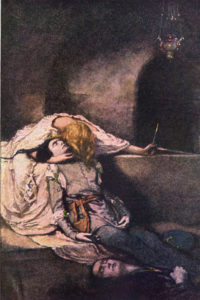
Looking for the answer to a crossword puzzle clue, “Romeo’s last words”? Look no further. Shakespeare Geek’s got the answer.
Originally I posted this content in relation to the finale of the musical HAIR, where it’s sung as background harmony. It became a massive hit for me once Google spotted it because “Romeo’s last words” frequently comes up as a crossword puzzle clue. Without further ado:
Eyes, look your last!
Romeo and Juliet, Act 5 Scene 3
Arms, take your last embrace! and, lips, O you
The doors of breath, seal with a righteous kiss
A dateless bargain to engrossing death!
Come, bitter conduct, come, unsavoury guide!
Thou desperate pilot, now at once run on
The dashing rocks thy sea-sick weary bark!
Here’s to my love! (drinks)
O true apothecary!
They drugs are quick. Thus with a kiss I die.
If you’re here for the crossword puzzle clue, it’s “I die”.
Beyond the Crossword: The Tragic Love Story of Romeo and Juliet
While the crossword puzzle answer may provide a brief moment of triumph, it’s essential not to overlook the deeper significance of Romeo’s last words within the larger context of the play. Romeo and Juliet‘s story is a timeless tale of forbidden love, feuding families, and unfolding tragic consequences. Romeo’s final words symbolize the culmination of their ill-fated romance, reflecting the intensity of their love and the devastating loss they both endure.
What was that about HAIR?
HAIR, the iconic rock musical of the 1960s, is a vibrant celebration of youth, freedom, and counterculture. The show, set against the backdrop of the Vietnam War era, explores themes of love, peace, and societal rebellion. In its powerful finale number, the musical brings together the exhilarating energy of the cast with a clever twist. The lyrics ingeniously incorporate quotes from Shakespeare’s Romeo and Juliet, infusing the modern narrative with timeless words. This blending of classic and contemporary elements adds depth and resonance, reminding us of the enduring relevance of love, sacrifice, and the pursuit of a better world.
Conclusion
So, if you’ve been seeking the answer to “Romeo’s Last Words” for your crossword puzzle, you now have the perfect clue to complete the grid. Remember, beyond its puzzle-solving value, Romeo’s final words hold immense emotional weight, representing the tragic ending of a legendary love story.
